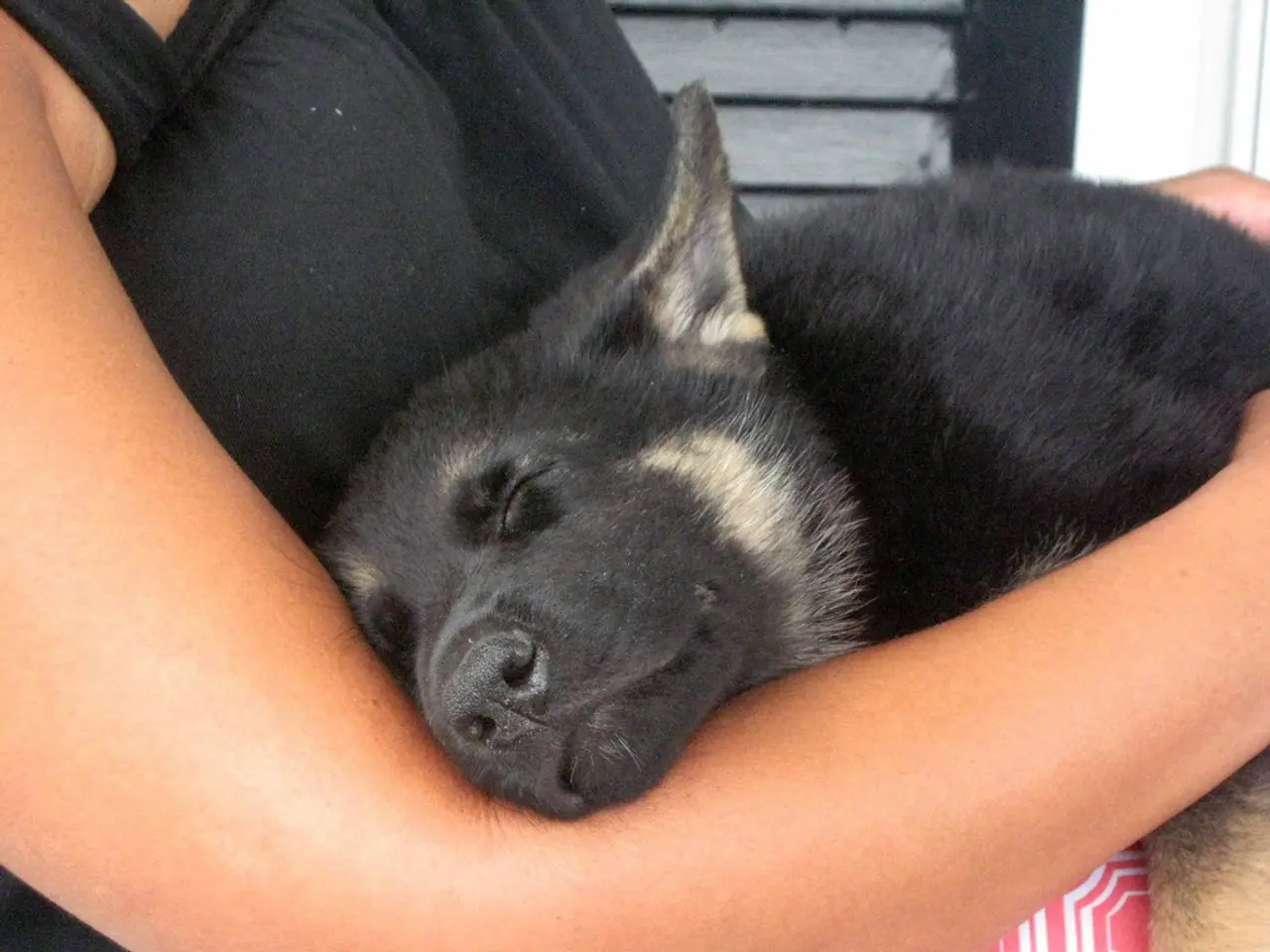Recognize Symptoms of Canine Cognitive Dysfunction Syndrome: Eye-opening Indicators Every Pet Owner Should Notice
Dogs, much like their human companions, can experience cognitive decline as they age, a condition known as Canine Cognitive Dysfunction (CCD) or 'doggy dementia'. Dr. Charlotte Rice, an in-house vet at pet supplement brand YuMOVE, has identified several signs that may indicate CCD in dogs.
Signs of Canine Cognitive Dysfunction
CCD typically develops gradually in senior dogs, and the following behavioural and cognitive changes may be observed:
- Disorientation or confusion in familiar surroundings: Dogs may get lost or stuck in corners, hesitate on stairs they have used for years, or seem lost and confused even in familiar settings.
- Changes in sleep patterns: Sleeping more during the day but becoming restless or active at night (sundowner syndrome) is a common sign. Some dogs may vocalize at night, disrupting their usual sleep cycle.
- House soiling: Loss of previously learned housetraining, causing urination or defecation inside the home, may also be a sign.
- Altered social behaviour: Dogs may become unusually clingy, anxious, withdrawn, or show decreased interest in play and interaction.
- Repetitive behaviours: Pacing, circling, vocalizing without clear cause, and staring blankly or appearing confused and vacant are all potential signs.
- Difficulty with routine tasks: For example, hesitating or staring at their food bowl as if confused about eating, or forgetting commands they once knew well.
- Sensory declines and altered eating habits may also be present.
Helping Dogs Cope with Cognitive Decline
While there is no cure for CCD, early recognition of symptoms and adapting your dog's environment and routine can significantly improve their quality of life. Here are some ways to help your dog cope:
- Veterinary consultation: Early and ongoing vet assessments are crucial to rule out other conditions and tailor support.
- Environmental modifications: Keep home layouts consistent, avoid major changes, and use gates to limit access to confusing areas.
- Routine and predictability: Maintain consistent feeding times, walks, and sleep schedules to reduce disorientation.
- Mental stimulation: Engage your dog with gentle training, new but easy tricks, puzzle feeders, or scent games appropriate to their ability.
- Comfort and companionship: Provide a calm, secure environment and respond sensitively to anxiety or clinginess.
- Manage activity levels: Encourage gentle exercise while avoiding overstimulation during vulnerable periods like nighttime.
- Dietary and supplement support: Some vets recommend antioxidants, omega-3 fatty acids, or specialized diets to support brain health, though evidence varies.
- Medications or treatments: In some cases, vets may prescribe medications to manage symptoms or slow the progression of cognitive decline.
Recognizing symptoms early and adapting your dog's environment and routine can make a world of difference for your senior dog. If you notice any of these signs in your aging dog, consult your veterinarian promptly.
- Aging dogs may display signs of Canine Cognitive Dysfunction (CCD), often resembling dementia in humans, such as disorientation, changes in sleep patterns, house soiling, altered social behavior, repetitive behaviors, difficulty with routine tasks, sensory declines, and altered eating habits.
- early recognition and addressing these symptoms can considerably enhance a senior dog's quality of life.
- Veterinary consultations are essential for ruling out other conditions, assessing the progression of CCD, and tailoring appropriate support.
- Environmental modifications, like maintaining consistent home layouts and using gates to limit access to confusing areas, can help reduce disorientation.
- Mental stimulation through training, new tricks, puzzle feeders, and scent games helps keep their mind active and engaged.
- Providing comfort, companionship, and managing activity levels, along with a calm, secure environment and adequate dietary and supplement support, can assist dogs in coping with cognitive decline.




